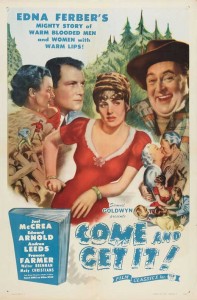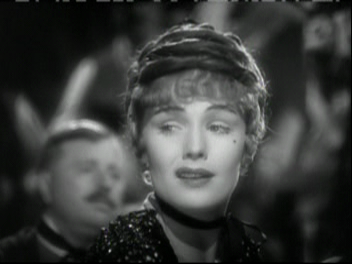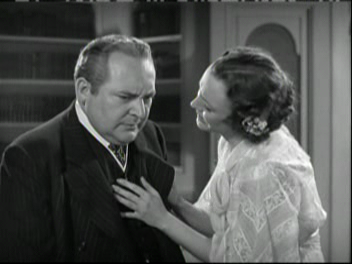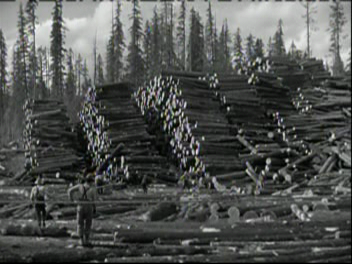|

Synopsis:
An ambitious lumberjack (Edward Arnold) marries the daughter (Mary Nash) of his business partner rather than the woman he really loves — saloon singer Lotta Morgan (Frances Farmer). Years later, he meets Lotta’s daughter (also Frances Farmer), and falls immediately in love with her — as does his son (Joel McCrea).
|
|
Genres, Themes, Actors, and Directors:
- Edward Arnold Films
- Frances Farmer Films
- Historical Drama
- Howard Hawks Films>
- Joel McCrea Films
- Rivalry
- Walter Brennan Films
- William Wyler Films
Response to Peary’s Review:
Peary’s response to this “well-mounted Samuel Goldwyn production of Edna Ferber’s novel” — “the only major film of Frances Farmer’s career” — is a bit of a surprise. He states that Farmer is “not so impressive that we can lament about how great her career would have been if Hollywood hadn’t destroyed her”, and argues that while “she is certainly capable and shows signs of intelligence”, “what’s most striking is how closely Jessica Lange resembles her in Frances“. I completely disagree. From the moment we first lay eyes on Lotta Morgan (Farmer in the first of dual roles), it’s difficult to look away: she’s both gorgeous and spunky, with a modern sensibility. In her second role (as Lotta Bostrom), she’s equally engaging, portraying just the right mix of a small town girl’s drive to make something of herself, and increasing dread at the realization of exactly what Arnold’s intentions are with her. Farmer is really the primary reason to see this movie, and film fanatics will be glad for the opportunity.
With that said, it’s a fine movie in many other respects as well. While it is a bit of a “conventional soaper” at times, the fact that it “becomes uncomfortable to watch in the second half [once] Arnold comes across as a ‘dirty old man'” simply adds to its authenticity. Indeed, the screenplay refreshingly never shirks away from dealing head-on with its somewhat disturbing premise, as married Arnold repeatedly fails to see exactly how creepy and inappropriate his advances towards young Lotta are. Clearly not a conventional leading man, Arnold (giving a “strong performance”) was an inspired choice to play the lead character here, with his bullish demeanor making it easy to sympathize with young Lotta’s dread. While I’m not particularly enamored by Walter Brennan’s Oscar-winning portrayal as Arnold’s best friend Swan (his broad Swedish accent comes across as a bit too heavy-handed at times), there are several fine supporting performances throughout — most notably Mady Christians as Lotta Bostrom’s concerned cousin, and Andrea Leeds as Arnold’s grown daughter (they have a particularly touching scene together). Watch for Brooke Shields’s grandfather, Frank Shields, in a bit role as Arnold’s daughter’s beau.
Note: This film was co-directed by Howard Hawks and William Wyler (with the latter taking over towards the end, and contributing far less).
Redeeming Qualities and Moments:
- Frances Farmer as both Lottas


- Edward Arnold as Barney

- Fine supporting performances

- The stunning, if disturbing, logging sequences near the beginning of the film

Must See?
Yes, primarily for Farmer’s performance, but also as a good show all around.
Categories
- Noteworthy Performance(s)
Links:
|
One thought on “Come and Get It / Roaring Timber (1936)”
Rather in total agreement here – mostly a must for Farmer’s dual-role performance. FFs will really not want to miss her in this. (One can’t help but wonder what might have been – had her film career actually become a real one.)
Overall, the film itself is a respectable piece of work and certainly one’s interest is sustained. (If I don’t have much to say about the general storyline, it’s probably because I have very little sympathy for the protagonist: a relentlessly, somewhat ruthlessly ambitious man who firmly believes he can ‘come and get it’, no matter what or when. Arnold does an admirable job capturing a character whose self-serving nature makes him difficult to care about.) The love triangle here is, of course, a unique one. ‘CAGI’ is well cast, with everyone turning in solid work. But, chances are, when you think about this film later, you’ll think about Farmer – and remember her. I’d seen this film years ago but, visiting it again, I’m struck by how impressive she really is in it.
It should be noted that Leeds is another actress of merit who had a short Hollywood career – tho, in her case, she retired from the screen early. Her performance here is quite lovely – and certainly refreshing when I think of her major role as the doomed actress in ‘Stage Door’. I never really cared for her in that film – but that’s not really her fault; it’s a hopelessly pathetic role to play.